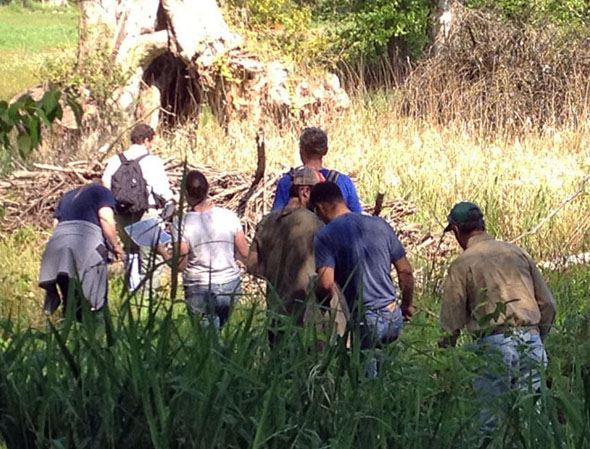
This training provides information and methods for determining the ordinary high water mark (OHWM) as defined in the state Shoreline Management Act (SMA). Waters regulated under the SMA include all tidal waters, streams greater than 20 cubic feet per second mean annual flow, water bodies greater than 20 acres in size, and any associated wetlands and deltas.
In this training, you will learn answers to these questions:
- How is the OHWM defined and where does it apply?
- What is the regulatory context and history of the OHWM?
- Why it is important to use field indicators to determine the OHWM?
- What are the most reliable field indicators on tidal waters, streams, lakes, and associated wetlands?
- What are some common misconceptions about OHWM determinations?
The three-day training includes two virtual sessions that will take place on Zoom on June 28 and June 29 (9:00 AM - 12:30 PM). Participants will have the option to log on 10 minutes early on day 1 for a brief Zoom introduction. On June 30, the participants will complete the field component of the training. Participants will practice how to determine the OHWM at four field sites in Yakima County (Sportsman Park) with an instructor. Please block your calendar from 8:00 AM - 4:30 PM for the field component.
For spring 2022, we request that everyone who participates in this training is fully vaccinated for COVID-19 by the implementation date. You will need to bring your COVID-19 vaccination card or a picture of your vaccination card to the training. Additionally, all participants will be expected to follow Washington Department of Ecology’s COVID-19 guidelines at the time of the training. Specifically, you will be asked to complete a health survey 12 hours before the field session and wear a mask.
Please email Sara Brostrom (bros461@ecy.wa.gov) if joining the in-person field session or the vaccination requirement is a barrier to participating in the training. We will work with you to find another option (11 AICP CM Credits/CEP Points).
Instructors
Rebecca Rothwell is a Wetlands Specialist in the Southwest Regional Office and the Shorelands Technical and Regulatory Lead for the Shorelands and Environmental Assistance Program. She has worked for Ecology since 2008, doing wetland mitigation compliance, wetland and shoreland permitting, assistance with CAO and SMP updates, OHWM determinations, and technical assistance with local governments. She has a BS in biology from the University of Puget Sound and a master’s of environmental studies from The Evergreen State College.
Lynn Schmidt is the Department of Ecology’s Statewide Flood Engineer, focusing on reducing flood risks to communities while enhancing natural floodplain functions. Her career has spanned a wide range of topics within the environmental and hydraulics engineering fields, including hydraulic modeling, river restoration, floodplain management, stormwater management, environmental investigations, and monitoring. Lynn holds a BS in Civil Engineering, MS in Environmental Engineering, and is a Professional Engineer and Certified Floodplain Manager.
Hallie Ladd is a Wetlands/Shorelines Specialist with Ecology. Hallie’s role is to provide permitting and technical assistance to the local jurisdictions and citizens of Eastern Washington. Her professional background includes work in aquatic ecology, fisheries, and natural resource damage assessment and restoration. Hallie’s education includes a Bachelor’s degree in Biology from Minnesota State University Moorhead and a Master’s degree in Fisheries Science from Texas Tech University.
Jeremy Sikes began working at the Department of Ecology in 2007 as a shorelines and wetlands permit specialist and transitioned to shorelines planning in 2012. Currently Jeremy is the Eastern Regional senior shorelines planner. In this role he works with local governments on Shoreline Master Program updates, conducts shoreline permit review and technical support, participates in statewide shorelines policy groups, and supports Ecology’s legislative actions and responses. Jeremy is an EWU alumnus with a BS in Biology and a minor in Planning. He previously worked as a fisheries specialist for both Tribal and state fisheries departments, and spent seven years as a consulting fisheries biologist throughout the western U.S.
Lori White is the regional Wetland, Shoreline, and Federal Permit Specialist for the southcentral counties of Washington. Lori joined our Central Regional Office in 2017. She has served in academia, consulting, and state government roles since completing her BS in Zoology from Southern Illinois University and her MS in Biology from the University of Louisiana at Monroe. Duties during that time varied from organismal research, museum collection, teaching, wildlife management, floodplain permitting, wetland delineation, and T & E species surveys. Currently, her focus is on providing the citizens and local governments of south-central Washington with technical assistance in Shoreline, wetland and 401 Water Quality Certification permitting.
Railin Santiago is a Shoreline Planner in Ecology’s Northwest Regional Office. She has 10 years of consulting experience as an environmental planner and Biologist. At ecology she provides technical assistance related to implementation of local Shoreline Master Programs, and Shoreline Permitting. She has a BS in biology from the Evergreen State College and a Master’s in Marine Affairs from the University of Washington’s School of Marine and Environmental Affairs.
Chris Luerkens works in Ecology’s Bellingham Field Office, where he has been a shoreline and wetlands permit specialist since 2018. His work is largely focused on reviewing permits, and providing technical assistance to local jurisdictions, including Ordinary High Water Mark determinations. Chris has a BS in environmental science from WWU and has been working in natural resource management since 2005. His background includes work in water quality, fisheries, and local government as a planner.
